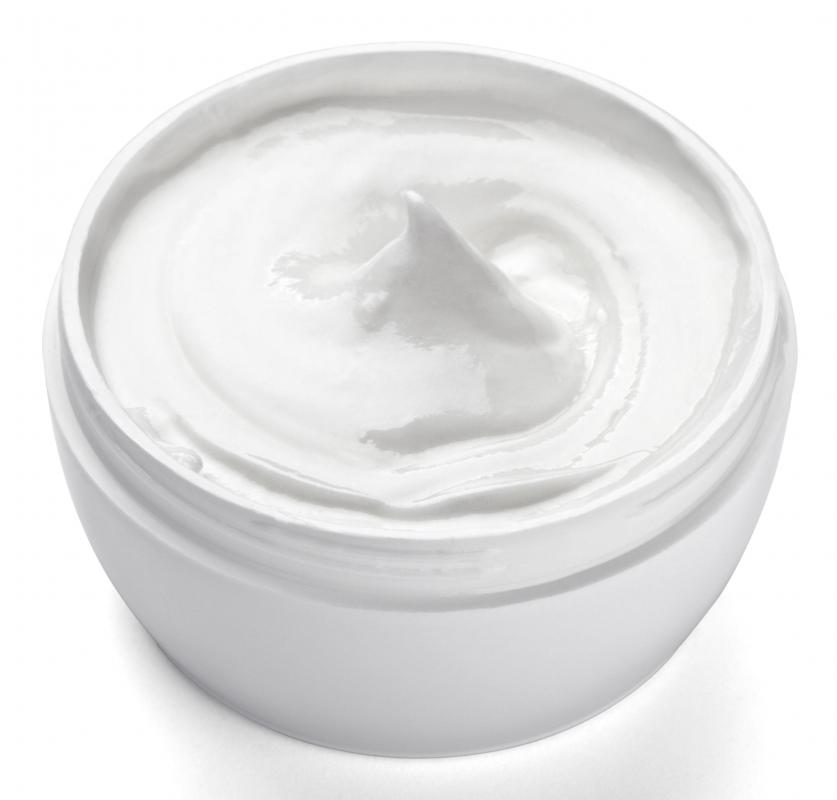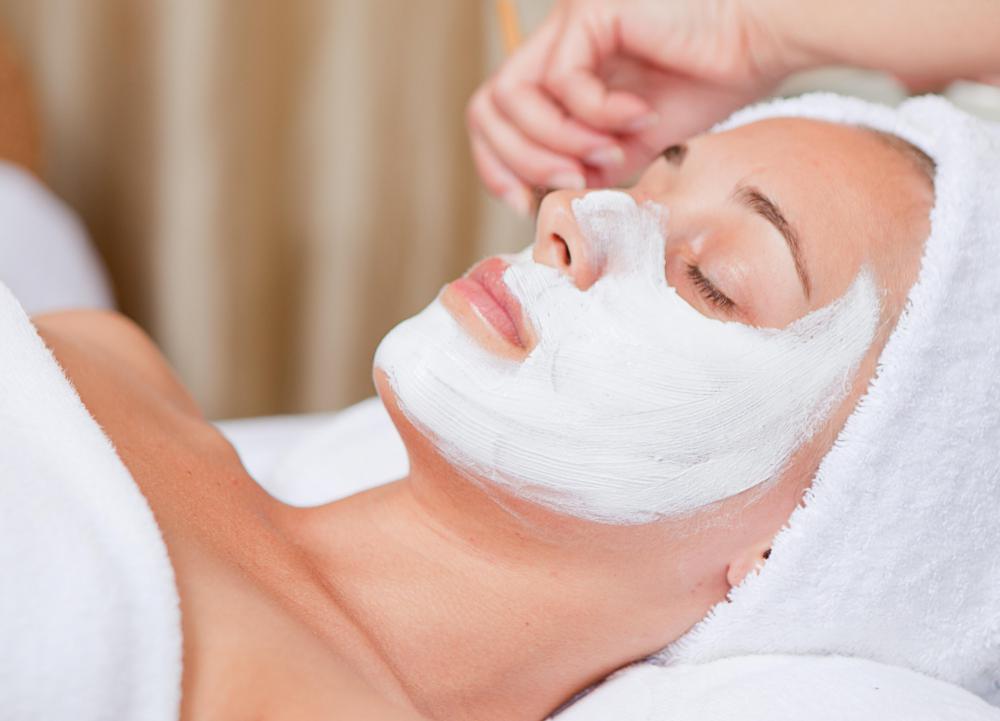At AllThingsNature, we're committed to delivering accurate, trustworthy information. Our expert-authored content is rigorously fact-checked and sourced from credible authorities. Discover how we uphold the highest standards in providing you with reliable knowledge.
What is Jojoba?
Jojoba is a plant native to the arid regions of the United States and Mexico. This plant provides important forage for many wild animals in this region, and it is also commercially important, thanks to the wax produced and stored in its seeds. Jojoba wax, also known as jojoba oil, is used in a wide variety of applications, from cosmetics to industrial lubricants, and it is very similar in composition to sperm whale oil, a product which is increasingly difficult to obtain.
The jojoba (pronounced ho-HO-ba) plant is a shrub with oval-shaped leathery leaves and small yellow flowers. The plant is designed to thrive in arid climates, so it is extremely water-efficient and good at storing energy for dry periods. The jojoba wax is the plant's way of storing lipids which can be used for energy.

Like many other desert plants, jojoba can look sort of scruffy and scraggly, but it appeals to a number of animals. While the seeds are difficult for most desert animals to digest, the leaves, twigs, and bark are all perfectly edible, and they make appealing snacks for many creatures. Humans can technically eat the seeds, but most do not, because the wax makes the seeds rather unpalatable, and also acts as a laxative, which can be undesirable.

When refined, the wax is odorless and clear, and it can be used in a wide variety of ways. Moisturizers and other cosmetic products often utilize jojoba oil, and it can also be used as a carrier oil for fragrances. Because it does not break down readily, jojoba oil is less likely to go rancid in storage, making it appealing for massage oils and body creams. Jojoba oil can also be used as a makeup remover, and a component in cold cream.

All of these traits also make jojoba oil popular from an industrial perspective, where it can be used as a lubricant, source for alternative fuel, and potential fungicide. The wax can also be refined into other products, such as esters and alcohols, which can be used in a variety of ways.
Thanks to its commercial value, jojoba is cultivated in many arid regions of the world, including the Middle East. It is a very hardy and reliable crop, making it appealing in regions where people may struggle to eke a living from poor soils and dry conditions. Jojoba is also in very high demand, making it a profitable crop for people who manage it well.
Frequently Asked Questions
What exactly is jojoba, and where does it come from?
Jojoba is a plant native to North America, specifically the arid regions of the Southwestern United States and Northwestern Mexico. It's scientifically known as Simmondsia chinensis and is prized for its seeds, which produce a wax ester similar to human sebum, making it a valuable ingredient in cosmetics and personal care products.
How is jojoba oil used in beauty and skincare products?
Jojoba oil is a versatile ingredient in beauty and skincare due to its moisturizing and emollient properties. It's commonly found in products like moisturizers, shampoos, and lip balms. Its similarity to human sebum allows it to help balance oil production, making it suitable for all skin types, including oily and acne-prone skin.
Can jojoba oil benefit my hair?
Yes, jojoba oil can be highly beneficial for hair. It can be used as a scalp treatment to help control dandruff and promote a healthy scalp environment, which is essential for hair growth. Additionally, its conditioning properties can add shine, softness, and manageability to your hair.
Is jojoba oil environmentally sustainable?
Jojoba oil is considered environmentally sustainable because jojoba plants are hardy, drought-resistant, and grow well in harsh desert climates where few other valuable plants can thrive. This means they don't compete with food crops for land and can be cultivated with minimal environmental impact.
Are there any side effects associated with using jojoba oil?
Jojoba oil is generally safe for most people and is known for its hypoallergenic properties. However, as with any product, some individuals may experience an allergic reaction. It's always recommended to perform a patch test before widespread use, especially if you have sensitive skin or known allergies.
What makes jojoba oil different from other plant oils?
Unlike most plant oils, which are primarily triglycerides, jojoba oil is a mixture of long-chain wax esters that closely resemble the sebum produced by human skin. This unique structure makes it more stable and gives it a longer shelf life than other oils. It also absorbs well without leaving a greasy residue.
AS FEATURED ON:
AS FEATURED ON:













Discussion Comments
Is it true that jojoba is going to be produced and sold as an appetite suppressant soon? There was an article about this in the news which said that scientists have discovered something called simmondsin that suppresses appetite in jojob.
It was found after using jojoba meal for animals when the animals quickly lost their appetite after eating and lost a lot of weight. I heard that it might be sold as an appetite suppressant now.
I have oily, acne prone skin and I have been looking for some natural treatments and moisturizers because I think that store bought cleansers and lotions dry out my skin too much and make the acne even worse.
I know that jojoba oil is good for dry skin. My cousin has super dry- almost flaky skin and she swore that jojoba oil is the only thing that helped her. I have also read very good reviews online by people who have oily skin but I couldn't understand how the same product can help both dry skin and oily skin.
I finally decided to buy some and try it, it has been one week and I am very happy with the results. Even though I have oily skin, my skin was actually very dehydrated because I clean it so much and the cleansers actually remove all the moisture along with the oil. Since I've been using jojoba oil as a skin moisturizer, my face feels much softer and healthier but not more oily. I think it helped replace the moisture I had lost.
I also have some bad dry patches around my mouth and those are gone too! I think this product is definitely worth trying and if it continues working like this, I might replace my regular moisturizer with this altogether. I would recommend using a very tiny amount though. You only need a few drops for your face and neck, if you apply too much, it doesn't absorb too well.
I can see why jojoba is popular for cultivation. I read that the jojoba seeds give half their weight as wax, which is quite remarkable. It is also not possible to synthesize something like jojoba oil in the lab, so it is very unique.
It would be great if developing nations could take more advantage of this plant and take their place in the jojoba market. I don't think it will happen though because cultivating jojoba still requires a specific climate and water. I've learned that jojoba couldn't be cultivated in some African countries because the jojoba flowers need a cooler temperature to bloom. It can't be cultivated in places where temperatures fall to freezing because that would kill the plant. It does well in dry climates but still needs water and good irrigation.
So cultivating jojoba is still a bit tricky and I think the countries which are now successfully cultivating it, especially U.S., Israel and Argentina are probably going to continue to dominate the global jojoba market.
Post your comments